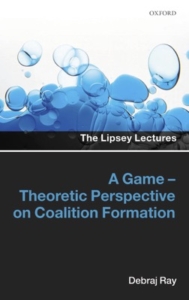|
This book is open access. Click image to download. From the back cover: ‘This beautifully written book synthesizes Ray’s compelling perspective on negotiation and coalition formation. It should be required reading for any young economic theorist who aspires to understand the frontiers of this critical topic.’ B. Douglas Bernheim, Edward Ames Edmonds Professor of Economics, Stanford University ‘Debraj Ray has systematically re-examined the theory of coalition formation. In this book, he develops a broad and fundamental theory to help us better understand the problems of forming efficient social structures.’ Roger Myerson, Glen A. Lloyd Distinguished Service Professor of Economics, University of Chicago ‘Debraj Ray, a remarkable and versatile economist, brings a fresh economic perspective to cooperative game theory. A must for anyone who wishes to discover the treasures hidden within the cooperative approach.’ Ariel Rubinstein , Professor of Economics, Tel Aviv University and New York University ‘Debraj Ray’s strategic analysis of dynamic negotiations shows that coalition agreements are sensitive to factors such as the bargaining protocol, externalities, renegotiation, and transfer payments—and the Coase Theorem’s prediction of efficiency is sustained only in restricted situations. This is but one strand of a rich panorama of results in this important book, and Ray’s substantial accomplishments in this area will inspire researchers and students alike.’ Robert Wilson , Adams Distinguished Professor of Management, Emeritus, Stanford Graduate School of Business. ‘Debraj Ray has been a pioneering contributor to the literature on coalition formation over the last two decades. Here he provides a masterful account of the rich and interrelated body of theory he and his co-authors have played a seminal role in developing. A defining and val- uable element of Ray’s perspective is a view of binding agreements emerging in an environment of non-cooperative interaction. The issues addressed lie at the heart of game theory, yet have received too little attention. One hopes that young scholars will use this superb monograph as a launching pad to explore the many important, fascinating and unresolved questions to which Ray directs our attention.’ Dilip Abreu, Edward E. Matthews, Class of 1953, Professor of Finance and Professor of Economics, Princeton University |
